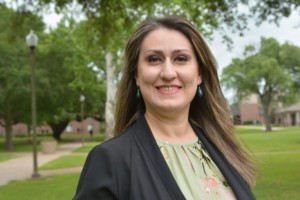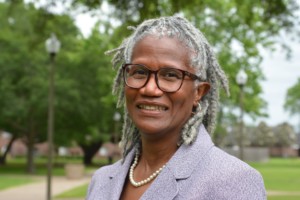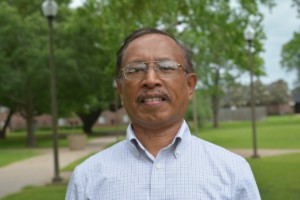PRAIRIE VIEW, Texas (August 16, 2022) – Having a diverse pipeline of well-trained STEM students ready to enter Ph.D. programs and, ultimately, the STEM workforce just got easier, thanks to a $1,712,952 National Institutes of Health/National Institute of General Medical Sciences funding award. While the solution is not simple, the principal investigator of the new initiative at Prairie View A&M University, Gloria Regisford, Ph.D., believes the funding will address future needs and challenges in biomedical sciences. These sciences include biology, chemistry, computer science, mathematics, animal science, nutrition, and chemical, electrical and computer engineering.
“All of these sciences contribute to basic biomedical research that leads to the development of vaccines and drugs that can cure diseases,” said Regisford.
Regisford has an overarching goal of promoting equity in science and health spaces as a professor in PVAMU’s Department of Biology, being recently named associate dean of Research-Sciences for the Marvin D. and June Samuel Brailsford College of Arts & Sciences. With this new grant from NIH/NIGMS entitled Undergraduate Research Training Initiative for Student Enhancement (U-RISE), Regisford and her team will train and prepare students from PVAMU to do just that.
“We aim to increase the number of underrepresented biomedical research scientists, to have a more diverse biomedical research workforce, and optimistically take a step towards achieving equity in science and health spaces,” she said.
A Multidisciplinary Effort
With a passion for mentoring and training students in research, Regisford assembled a team from PVAMU’s Colleges of Agriculture and Human Sciences, Arts and Sciences, and Engineering to implement the five-year training grant.
“Upon receiving the notice of the grant award, I was simply thrilled with the good news,” she said. “I am so proud of our multidisciplinary team’s accomplishment and feel truly inspired by the hope of PVAMU producing more productive people who ultimately become biomedical research scientists.”
Noushin Ghaffari, Ph.D., assistant professor of computer science in PVAMU’s Roy G. Perry College of Engineering, is one of the co-principal investigators on the project. Ghaffari is looking forward to recruiting and training the next generation of researchers.
“Students will get involved in cutting-edge research in areas, such as bioinformatics,” she said. “This will pave the way for their success in biomedical research. It is a great avenue.”
Another co-PI, Laura Carson, Ph.D., serves as a research scientist and director of undergraduate research and research compliance in PVAMU’s College of Agriculture and Human Sciences. Carson sees this as an excellent opportunity to involve students in research who have an interest in furthering their academic endeavors.
“I am looking forward to engaging with students and helping them navigate their way to a Ph.D. program,” Carson said. “I am also looking forward to seeing the students gain an interest in performing biomedical research and watching their confidence levels explode during their ‘ah-ha’ moments. It is such a joy to watch their eyes gleam with excitement.”
Tools to Succeed
In addition to reaching a large population of racial and ethnic underrepresented students with disadvantaged socio-economic backgrounds, the new U-RISE at PVAMU program will reach first-generation students.
“Students will be involved in a robust mentoring program that supports and motivates them to succeed,” said Regisford. “They will also receive financial support to remove the need to work off campus or obtain [additional] student loans. In addition, students will have opportunities to engage in biomedical research with some of our brilliant research scientists and participate in an enriched academic curriculum that highlights the research process.”
With leadership from the vice president for Research & Innovation, the university promotes undergraduate engagement in research and is in “full support” of this newly funded program.
“For the National Institutes of Health to select Prairie View A&M University and award the major U-RISE sponsored project signifies our continued growth in research prominence,” said Vice President of Research & Innovation Magesh Rajan, Ph.D., P.E., MBA. “Our cross-disciplinary faculty are committed to nurturing and developing today’s young scholars into tomorrow’s research-focused experts. Dr. Regisford’s team is dedicated to involving and training PVAMU students in their respective disciplines. This grant empowers them to expand their efforts and impact a greater number of students to become future researchers and address the gaps in national workforce demands.”
PVAMU’s status as a Carnegie Research 2 university and its established collaborations with surrounding research-intensive universities provide a robust learning environment that strongly supports the U-RISE program.
Co-PI Ananda Amarasekara, Ph.D., professor and interim head of PVAMU’s Chemistry and Physics Departments, is intrigued by the biomedical science-related collaborative research projects that may start as a result of the funding.
“Research publications and presentations resulting from this grant will help PVAMU keep its R2 status,” Amarasekara said.
A Future that’s Within Reach
Although student enrollment in biomedical science disciplines is relatively high at PVAMU, less than 10% of students declare an interest in graduate school. This conundrum may be due to a lack of exposure and preparation for the rigors of graduate school. The U-RISE at PVAMU program seeks to address this concern.
“U-RISE will enhance the research culture at PVAMU by having more of our students engaged in research activities with our resident research scientists,” Regisford said.
The U-RISE at PVAMU program will recruit four students each year over a period of five years. To participate in the program, sophomore students must be a member of a racial and ethnic underrepresented population with a declared major in a biomedical science discipline (biology, chemistry, computer science, mathematics, animal science, nutrition, chemical or electrical engineering). They must also desire to pursue a doctoral degree in biomedical sciences.
“The U-RISE at PVAMU trainees will experience hands-on research with an enriched interdisciplinary research culture for three years. A team of faculty, research professors and scientists, and external collaborators will create a nurturing and stimulating culture of support,” said Regisford.
“I am excited about every aspect of our proposed U-RISE at PVAMU program,” she continued. “I look forward to working closely with everyone, especially the students, research mentors and my multidisciplinary management team.”
-PVAMU-




